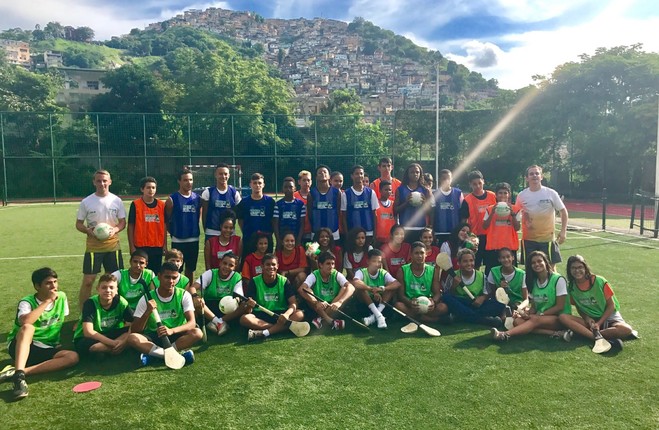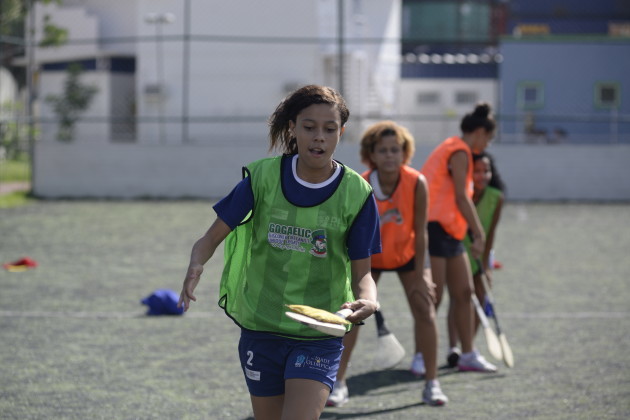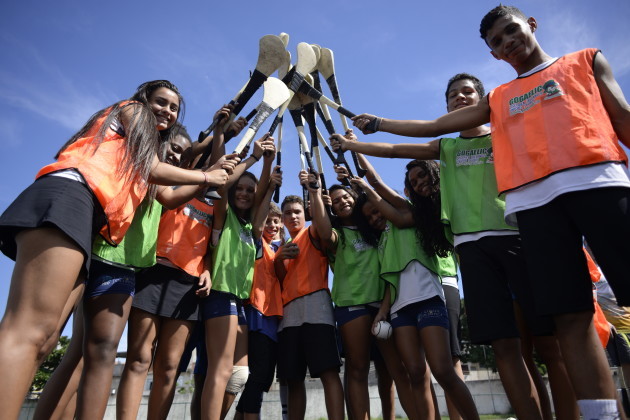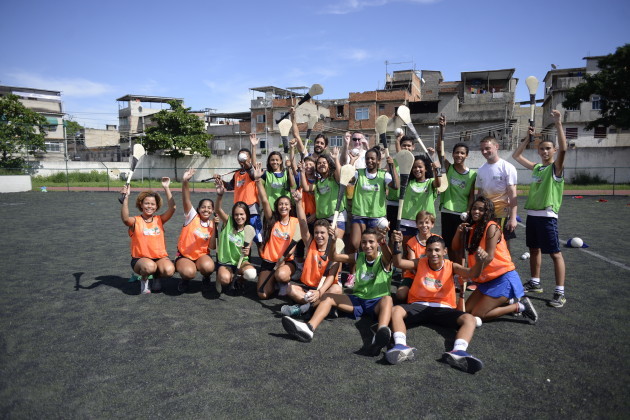IN SOUTH AMERICA, futbol is king. In the land of Pele, Maradona and Garrincha the country’s GAA community is modest in size and, by all agreeable standards, largely non-existent.
Apart from Hurling Club of Buenos Aires, established in 1900 by Irish immigrants, which initially struggled due to problems importing hurls, there is no other official Gaelic games club located in the entire continent.
With that in mind Eoin Brennan and Eoin Vaughan, co-founders of Go Gaelic, made the 9,000km journey to Rio de Janeiro. The objective? “We wanted to spark something and hopefully blossom some sort of a GAA presence in Brazil,” says Brennan, a journalist with the Clare People.
Both men had taken a journey around the world while travelling as students a decade ago. Initially lining out with Seoul Gaels in South Korea, the pair made the trip of a lifetime to Brazil and knew their brief stay would lead them back to its sun-kissed beaches again.
“We were teaching in Korea for about 18 months. We were playing for Seoul Gaels and found that about 20% of the team were Irish. The rest were from a range of different nationalities, including Korean, American, Canadian and Australian,” says Brennan.
“We thought there was a market there for introducing tourists to Gaelic games. On our first trip we visited South America and went to Brazil. We were there for about four months and traveled the length and breadth of the country.
“We thought there was a great cultural aspect to the country and a great diversity of people. In the back of our minds we thought maybe we could go back some time and introduce them to a bit of Irish culture.”
Brennan and Vaughan founded Go Gaelic five years ago, a company which aims to help people discover Ireland’s “unique sporting pursuits of hurling and Gaelic” through workshops and introductory courses.
Its goal is to help those unaccustomed to Irish sport understand the societal significance of Gaelic games to the country’s history, all the while teaching them the basics of the games themselves in a friendly learning environment.
The history of the GAA outside of Ireland is a long and rich one, but Brazil’s GAA presence is non-existent, they say, with just 650 Irish residents living in the country alone.
There are over 2,000 GAA clubs across the world, from popular Irish diaspora locations such as the United States, Australia, Canada and London while smaller, lesser-known clubs populate countries like Qatar, Kuwait, Vietnam, The Netherlands and Estonia in various forms. Brazil, however, has gone untouched.
Combining their love of Brazilian culture and gaelic games, Brennan and Vaughan set their minds to introducing the country to both disciplines.
With the help of fellow Clare native and Deputy Consul General of Brazil, Ciara Gilvarry, they visited private and public schools where they witnessed the untenable bridge in wealth between the rich and poor classes, teaching them to play Gaelic and hurling.
“We were doing it one day in private schools in Sao Paolo with the elite going in in bullet proof cars and security checks,” says Vaughan. “Then the following day we are doing it in an underprivileged area.
“We were in private schools that would cost a couple of thousand euro a term and we also went to the public schools and to the favelas where some of the kids might not have the opportunities others in school do.
“It sums up Brazil, really. We really witnessed the extremes of wealth and otherwise. Within the favelas there are a lot of good working people who get a bad name. The people we met there were ordinary people, extremely welcoming, loved sport and who were all doing their best for their kids.”
The Ennis men visited three cities in total: Sao Paulo, Brasilia and Rio de Janeiro, which consisted of 15-20 Gaelic games training sessions in the space of two weeks.
Both men acknowledge two important aspects of what made the trip such a success: the innate love of sport which Brazil evokes as a nation, and the easy-going attitude its people have to life. Something, Brennan says, which is akin to the Irish mentality.
“There’s a legacy in Brazil after the Olympics where they had set up sports-specific schools. They would introduce the kids from a young age to a range of different sports like judo or volleyball or chess or badminton. They would do two hours every day of sport alongside their studies in the hope that they would one day become Olympians.
“Also because Brazil is a sports-mad country, keeping sport at the centre of their studies is natural for them. We would be trying to explain to them that in Ireland you only do one hour of PE a week in primary school, whereas they would do two hours a day. Because of that they took up the games a lot easier as they had tried a number of sports across different disciplines.
“The kids would have taken a multifaceted approach, rather than being sport-specific, which meant they were able to pick up Gaelic and hurling a lot handier. Hurling is very unique but they might have previously played tennis or baseball. And we would have marketed Gaelic football to them as a mixture between soccer, rugby, basketball and volleyball. Therefore they would have been able to pick Gaelic up a lot easier as opposed to hurling.
“It was amazing. In one hour’s coaching they really took to the games and you can only imagine the level they’d get to with regular training.”
The lessons, led by Brennan and Vaughan along with coaches Darryl Eade and Kevin Brennan, were purposefully easy-going.
They prioritised safety and fun for the children, consisting of games, drills, balancing beanie bags on hurls and playing small matches so that the participants came away with a positive experience, rather than instilling any kind of competitive atmosphere.
“Football is a religion in Brazil,” says Brennan. “But they were amazed to find out that there were players here in Ireland that are completely amateur, would play in front of 80,000 people and are just playing for the pride and passion of the jersey rather than money.
“They really took to playing Gaelic. We were a little apprehensive going over that it would be difficult to teach a game to people who had never even heard of it before. But they really, really embraced the games.”
Both men developed a deep love of the country’s outlook on life as well as its language, traditions and culture during their brief stay as students 10 years ago.
They say that despite the persistent economic hardships and political turmoil which its people have had to endure in recent years, they maintain a free spirited and buoyant attitude to everyday life. This, they say, is what resonates between Irish and Brazilians so much.
“The people are very warm. Even amongst the Brazilians in Ireland, there is a natural affinity amongst them. Like Irish people they would describe themselves as having a relaxed, easy-going approach to life.
“They have a lot of political issues and they have a very violent society with high levels of unemployment. But they have this amazing ability to put all of that aside, party until six in the morning and then deal with it the following morning. I think Irish people are a little bit like that as well,” says Vaughan.
As for the legacy of their trip, the men say they would be excited to export GAA to other countries outside of Brazil. With the country’s first ever club in the early stages of being developed – the Sao Paolo Shamrocks – a squad of Brazilian nationals playing hurling on the golden sands of Copacabana Beach could be a sight to behold in years to come.
The42 is on Instagram! Tap the button below on your phone to follow us!




